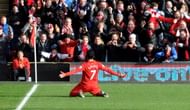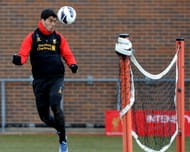They say all press is good press. And those who say so think they are right because being in the press means you get attention. Being in the press means everybody takes notice of you and that, at its most base level, means you are famous. And your continuous presence in the media is necessary for you to continue to be famous.
Modern man has a very short attention span, given the information explosion that is taking place around him, which means there is a slew of news out there constantly jostling to get his attention. Lose the media and you cease to become famous (hence the expression ’15 minutes of fame’).
Those who say all press is good press are, however, forgetting one very important aspect: for what reason has the press centred itself around you?
In the case of Luis Suarez, sadly, it seems to be a scenario of what the press considers to be gross misdemeanours by the Liverpool striker. The press’s relationship with the talented Uruguayan is, sadly, a vicious cycle that only helps the media sell more newspapers on the streets.
The easiest way to provoke someone is to poke him or her repeatedly. They will sooner or later pay attention to you (whether they initially wanted to or not) and because you have been irking them, they will lash out. When they do lash out, the media’s flashbulbs are there to capture it in detail, and it is not uncommon to see detailed ‘analysis’ from specialists in the field, accompanied by a few zoomed in, grainy photographs that cast the spotlight over exactly what it is that Suarez has done.
And because the tendency of the human mind is to remember all that is negative, the image that forms over time is one of a player a majority of people sadly love to hate.
“This is a general tendency for everyone. Some people do have a more positive outlook, but almost everyone remembers negative things more strongly and in more detail.”
- Clifford Naas, Professor of Communication, Stanford University
The reason people remember negative actions for longer periods of time is because they involve more thinking, writes Alina Tugend of the New York Times. Information about negative acts requires more detailed processing and therefore those acts become stronger memories.
Add that argument to the reason we look at Suarez the way we do and it suddenly becomes clear. Those who are the masterminds at the presses of course know this, and that is why they try to prey on these human sentiments. But the targeting of Suarez by the presses (yes, I have made that assumption here) is a rather complex mixture which, when taken apart, shows the multi-faceted plan of attack on him.
It is now well known that the English media borders on the jingoistic. The best example to highlight this is Andy Murray’s recent win over Novak Djokovic in the final of the Wimbledon championships a few weeks ago. The press went ga-ga over his victory, which was only made all the more special since he was the first male Briton to win the famous old trophy since 1936.
Most papers dedicated pages of column length to him (conveniently forgetting that Virginia Wade had lifted it in 1977, with American publication The Atlantic politely reminding them so, but that is a tale for another time), calling him a hero for all of Great Britain to be proud of, a sentiment that was similarly echoed when he grabbed gold at the Olympics a year ago.
But losses, which are only naturally of a greater number than championship wins for any sportsman, did not belong to ‘Britain’s Murray’, in the eyes of the media.
No, those are shouldered by ‘Scotland’s Murray’, and such is the double standard, fair-weather stance that the media employs towards all forms of sport and the British Isles take part in.
The England cricket team has a large number of South Africans who have decided to play for them after becoming naturalised citizens. Players such as Craig Kieswetter and Kevin Pietersen are always lauded when England deliver the goods and are treated like one of their own but their immigrant roots are soon picked on when England suffer a humiliating defeat.
“A lot of human nature is hateful—a desire to defeat, even to kill, those whom we view as a threat. The mixture is not so hard to understand. We feel altruism toward members of our group, and to hate members outside of our group.
“Any public figure who appeals to the base instinct of hatred is going to get more unquestioning support than someone who appeals to love and reason. The altruist may get more reasoned support, but cannot win the battle for unquestioning support.”
- Stan Rice
Ditto the case with rugby. Manu Tuilagi is a Samoan-born rugby player who chose to represent England and while much praise was being showered on him prior to making his professional début for his adopted home, papers forgot to mention that he had five older brothers, all of whom were Samoan internationals and far better than him.
What was worse is that they glossed over the fact that he had actually stayed in England illegally for six years, at a time when the UK is tightening its laws over immigration and border control.
It is this same jingoism that is employed when Luis Suarez takes a dive on the football field. The papers are quick to vilify him as one who tarnishes the English game. But where are those accusatory sentiments and lines of vitriol when Gareth Bale, Jermaine Defoe and Ashley Young do not hesitate before taking a tumble after coming into contact with a passing breeze?
Bale is lauded as Wales’ next big superstar, the man to fill the boots of the legendary Ryan Giggs, but when he and the rest of those mentioned above do dive, it is an attitude of discreet patronisation towards the player having successfully hoodwinked the opponents and getting away with it.
But it’s not just Suarez. Another player of South American origin, Eduardo, when he was at Arsenal, was hurled brickbats at for apparently taking a tumble in a Champions League dead rubber against Celtic, who promptly took their case to UEFA, who in turn suspended Eduardo after a media storm in the UK. Arsenal however appealed the ban and it was quickly rescinded.
In their attempts to sway public opinion, how quickly the press forgot that just a few months prior to that incident, Eduardo had made a comeback that had seemed nigh impossible after he had suffered a double leg break at Birmingham in 2008, with doctors wondering whether he would even be able to walk again.
British Prime Minister David Cameron often speaks of a multicultural Britain where peace and understanding are the norm, but given the way the press handled the entire Suarez-Patrice Evra racism incident, one wonders whether they did indeed pay attention to what their nation’s leader was saying.
The entire incident stemmed from the fact that Suarez had called the Manchester United defender a ‘negro’, which is actually a colloquial term of endearment in Uruguay. Cameron may speak of multiculturalism but there was no attempt made by the media when it came to actually understanding Suarez, and by extension, Uruguayan culture. How then, can there be talk of multiculturalism?
Luis Suárez admitted he and his wife, Sofia, “cried a lot” during that week of travelling back and forth to Manchester to protest his innocence in the Patrice Evra affair. There was utter despair when the guilty verdict arrived accompanied by an eight-match suspension. We can only guess at the extent of the misery in the Suárez household following the 10-match ban for biting Branislav Ivanovic but, crucially, so can Liverpool.
- Andy Hunter, The Guardian
The papers did at least report that Suarez did weep over what he had done before the FA delivered its verdict, but that was more a statement in passing than anything concrete. Papers focused more over his future at Liverpool, and rather disgustingly, a requirement for him to have anger management counselling. That racism row was a one-off incident, but where was this Linotype during the John Terry-Anton Ferdinand affair? Where was the suggestion of Terry taking counselling at that time?
There wasn’t any.
While there is no excuse to what he did to Branislav Ivanovic, Suarez would have surely wanted to say something in terms of an apology. All that was mentioned at the time was that the Serb did indeed accept it. Once again, there was no motion by the papers to record what Suarez had said, or wanted to say.
The 10-match ban that Suarez received was because the FA wanted to send a “strong message that such deplorable behaviours do not have a place in football”, while noting that “all players in the higher level of the game are seen as role models, have the duty to act professionally and responsibly, and set the highest example of good conduct to the rest of the game – especially to young players.”
If footballers are indeed seen as role models, then is it not the role of the press, who pride themselves as the silent guardians of all that goes on, to further that image? Is it also not their responsibility to make sure that footballers are portrayed in the right light, with more attention given to what they do right, if the next generation of people are to be brought up the right way? Papers were quick to decry what Suarez did, but there was little praise of what he did to rectify those errors.
But then, as Dan Brown has now popularised, quis custodiet ipsos custodes? Who will guard the guards?
Given all that has happened, it makes sense to see Suarez want a move away from the UK. The minds of young children are extremely impressionable and it is to these children that the media owes the responsibility of inculcating the right ideas. And that can only happen if their parents, who are responsible for bringing them up, are also allowed access to news that contains the right values.
The EPL is the world’s most competitive football league, but the press should realise that that competitiveness is coming at a cost. While they may not have been responsible for some of the less appetising qualities that Suarez brought to England, that they have exacerbated these qualities and have drawn attention away from the fact that he is an excellent striker with world-class attributes that the league is lucky to have is undeniable.
But given the attitude shown to him by the press, the league may not be so lucky in the future. And that needs to change for the good of the game.


